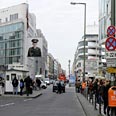
Young Israelis moving to Berlin in droves
City from which Hitler unleashed genocide of six million Jews now attracting small but growing community of Jews from Israel for whom it embodies freedom, tolerance, anything-goes spirit
Nirit Bialer, granddaughter of Holocaust survivors, welcomes listeners in Hebrew to a one-hour radio show of music, talk and interviews. The setting isn't her native Israel but a radio station in the heart of the German capital – and hundreds of Israeli Berliners are tuning in.
The city from which Hitler unleashed the genocide of 6 million Jews is now attracting a small but growing community of Jews from Israel for whom it embodies freedom, tolerance, and an anything-goes spirit.
"Berlin has become a real magnet for Israelis – everybody wants to move here," said Bialer, 32, whose Friday noon "Kol Berlin," Hebrew for "the voice of Berlin," started three years ago and is something of an institution for young Israelis in Berlin.
Nobody knows exactly how many Israelis have moved here in recent years; unofficial estimates suggest 9,000 to 15,000 – far fewer than the 120,000 Jews who lived in Berlin before the Nazis came to power in 1933.
But their presence is a powerful symbol of generational change. Years ago, Israelis viewed emigration from their country as a betrayal of the Zionist cause, and moving to Germany was reviled as the worst betrayal of all.
Many wouldn't set foot in Germany even as tourists. Today, Israelis make up the second-largest group of non-European tourists coming to Berlin, after Americans. The streets of Tel Aviv feature billboards featuring Berlin's landmark Brandenburg Gate as a tourist attraction.

'You suddenly realize who you are as a Jew. ' Berlin (Photo: Joseph Jackson)
The Israelis who come to stay are looking to work, study, party and make art, and don't seem to care much about the Nazi past. They arrive on student visas, overstay tourist permits or have German or other European ancestry that entitles them to citizenship. Many start families with German partners, far from the tensions of the Middle East.
"I love Israel, but I just couldn't live there anymore - it's like a small village and so militaristic," explained Lea Fabrikant, a photography student who arrived two years ago.
"Most of all, I needed freedom and space, and I found it here."
Fabrikant, 26, said she lived through the many suicide bombings in Jerusalem, her home town, during the 1990s, and loves Berlin's tranquility, relaxed spirit and affordability for students and artists.
Germany's past, she said, "doesn't affect me at all."
New Jewish community
On the other hand, Asaf Leshem, a 36-year-old travel guide, said his move three years ago had much to do with his family's past in Germany.
He has walked through the Schoeneberg neighborhood where his grandfather lived as a child before emigrating in 1938, and visited the family plot at the Jewish cemetery in Weissensee.
Leshem thinks his grandfather, were he alive, would have supported his decision.
"The Nazis ruled Germany for 12 years and many German Jews felt like the Nazis abducted the country from them," Leshem said. "They also had good memories, especially from their childhood in Germany, how they used to go on trips to the Baltic Sea or go for a swim in Berlin's Grunewald forest."
Leshem grew up in Israel but says he feels a bit German himself and appreciates German culture.
For those who miss the flavors of home there are Israeli delicatessens, bakeries, bars and child care groups. Berlin is friendly to gays, and the Israelis among them throw a monthly party, called "Meshuggah" – Yiddish for "crazy."
Udi Cohen, 32, wandered around the US and Europe for years before settling in Berlin. He opened "Luigi Zuckermann," a bistro in Berlin's Mitte district where he sells sandwiches and salads with an Israeli twist.
"In Israel, I couldn't function, I couldn't find a job, but here I'm fine and enjoy the vibe and energy of the city," he said.
Gal Bar-Adon, 27, learned trombone in Berlin and produces dancefloor music that he said is played in clubs across the city and beyond. "Israel is simply too small," he said. "There's not enough of an audience for my kind of music."
Bialer said that despite Berlin's attraction, living here also means coming to terms with Germany's past. She notices that sustained conversation with Germans inevitably shifts to the Nazi era.
"It can be exhausting, it can be liberating – but it is a sure thing that at some point we will talk about the Holocaust," she said.
When the grandchildren of the victims and of the perpetrators meet for the first time, the experience can be sensitive and guilt-ridden.
Living here has also made Bialer more aware of her Jewishness.
"In Israel you don't think about what it means to be Jewish because everybody is celebrating Shabbat or the Rosh Hashana" (Sabbath and Jewish New Year), she said. "In Germany, you suddenly realize who you are as a Jew and you're different from everybody else around you."
In the end, Bailer said, an Israeli influx could start to fill the void left by the Holocaust.
"I think there's something growing here: A new Jewish community in Berlin."
- Follow Ynetnews on Facebook










